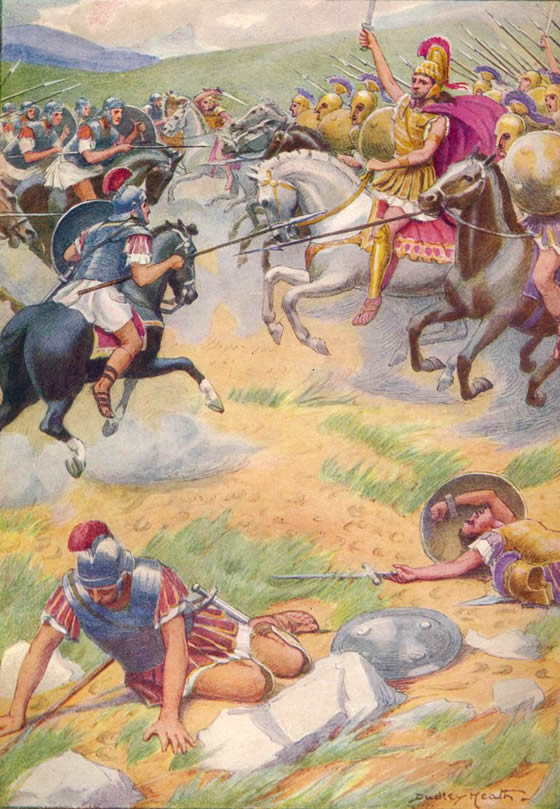Pyrrhus (the Greek word for "fiery red") was the pugilistic king of the Hellenistic kingdom of Epirus from 306 to 301 b.c.e. and again from 297 to 272 b.c.e. His costly but successful military tactics against Macedonia and Rome gave rise to the phrase Pyrrhic victory.
Primary sources for his life include The Life of Pyrrhus by the Greek historian Plutarch, the Periochae by the Roman historian Livy, and the History of the Samnite War by Appian of Alexandria. Born the son of Epirot king Aeacides and a Greek named Phthia, the daughter of a hero in the Greek war of liberation against the Macedonians, Pyrrhus spent his first two years in the royal court of Epirus.
When Aeacides was deposed by his subjects and his adherents executed, Pyrrhus was smuggled out of the country and taken to safety to the court of King Glaucias of Illyria, who reluctantly agreed to raise Pyrrhus with his own children. When Pyrrhus was 12 (306 b.c.e.), Glaucias invaded Epirus and restored Pyrrhus to its throne.
  |
Hated by his Molossian subjects, Pyrrhus’s first reign came to an end as a result of a coup that occurred while he was attending the wedding of a son of Glaucias. The revolutionaries, led by Cassander, plundered Pyrrhus’s property and invited Neoptolemus II to be king in 302 b.c.e. Pyrrhus took refuge with his sister’s husband, Demetrius—son of Antigonus, the king of Asia. After Antigonus and Demetrius lost the Battle of Ipsus (301 b.c.e.), Ptolemy I of Egypt took Pyrrhus hostage.
This seemingly inhospitable situation proved fruitful for Pyrrhus, who impressed Ptolemy with his strength and courage at hunting parties and worked his charm on Berenice, Ptolemy’s wife, leading her to permit Pyrrhus to marry Antigone, her daughter from a previous marriage. In 297 b.c.e. Ptolemy financed a new coup in Epirus and sent Pyrrhus back to his homeland with an army of mercenaries, where he reclaimed the throne through a series of shrewd political dealings.
Announcing that he would share power with Neoptolemus, Pyrrhus first became leader of the Epirote confederacy and then duped his people into believing that his colleague had committed treason, finally killing Neoptolemus at a banquet to assume the kingship. Pyrrhus now acted as Ptolemy’s watchdog in Europe, guarding Egyptian interests against archrival Cassander of Macedonia.
 |
| Pyrrhic war |
When Cassander died, he left his throne to his son Philip IV, who died within two months. Consequently, Cassander’s other two sons, the elder Antipater and the younger Alexander, unsuccessfully attempted to divide the kingdom. When hostility between the brothers erupted, Antipater sent Alexander into exile, with Alexander fleeing to Pyrrhus.
In exchange for invading Macedonia in 294 b.c.e. and securing a balance of power between the two brothers, Pyrrhus received more territory in the northwestern parts of Greece. When Demetrius, Pyrrhus’s erstwhile friend and ally, killed Alexander and took over Macedonia, the relationship between the two rulers grew bitter and soon broke out into war in 291 b.c.e.
Pyrrhus defeated Pantauchus, one of Demetrius’s generals, and then invaded Macedonia in search of plunder. For a brief period Demetrius became dangerously ill, and Pyrrhus came close to capturing the whole of Macedonia. Once Demetrius had recovered enough to take the field, Pyrrhus made a hasty retreat back to Epirus.
   |
This retreat was short lived, as Pyrrhus, with the help of King Lysimachus of Thrace, invaded Macedonia in 288 b.c.e. when the Macedonians revolted against Demetrius. In 287 b.c.e. Pyrrhus and Lysimachus were recognized as co-regents of Macedonia, with the river Axios as border between the former’s western and the latter’s eastern regions.
Two years later Pyrrhus was forced to resign his Macedonian lands to Lysimachus. Temporarily resigned to Epirus, the warrior king next turned his attention to conquering Roman territories.
In 281 b.c.e. the citizens of Tarentum came under attack from Rome and turned to Pyrrhus for help. Pyrrhus sent more than 3,000 soldiers and his adviser Cineas, followed by a fleet and 20 elephants, 3,000 cavalry, 20,000 infantry, 2,000 archers, and 500 slingers.
Upon arriving at Tarentum, Pyrrhus assembled his forces and imposed a more disciplined way of life upon the inhabitants. Setting out from there, Pyrrhus defeated the Roman army in a battle on the banks of the river Siris. He proceeded to march toward Rome, but when he learned that the Romans had raised more troops, he sent Cineas to make peace with the Romans.
Although initially inclined to accept Cineas’s proposals, an impassioned speech by Appius Claudius convinced the Senate to reply that Pyrrhus leave Italy without a treaty or alliance. Unwilling to accede to the Senate’s wishes, Pyrrhus embarked on the infamous Battle of Asculum (279 b.c.e.), where he won at the devastating price of 4,000 casualties.
It was on this occasion that Pyrrhus remarked, "Another such victory and I shall be ruined", resulting in the term Pyrrhic victory for a victory obtained at too great a cost. At this juncture the Sicilians sought Pyrrhus’s aid against the Carthaginians, thus giving him an excuse to leave Italy.
Pyrrhus campaigned in Sicily for two years, but the Sicilians came to hate him because of his execution of Thoenon, one of their leading citizens, on suspicion of treason. Pyrrhus then returned to Italy, where he was defeated at Beneventum in 275 b.c.e. Three years later the Peloponnesian ruler Cleonymus invited Pyrrhus to intervene in his struggle with the Spartan king Areus.
Notwithstanding his army of 25,000 infantry, 2,000 cavalry, and 24 elephants, Pyrrhus was unable to capture Sparta. Attacked en route by the Spartans at Argos, Pyrrhus and his forces took to street fighting, in which a tile hurled from a roof by an Argive woman stunned Pyrrhus. While he was partly unconscious, one of Areus’s men recognized him and killed him.
